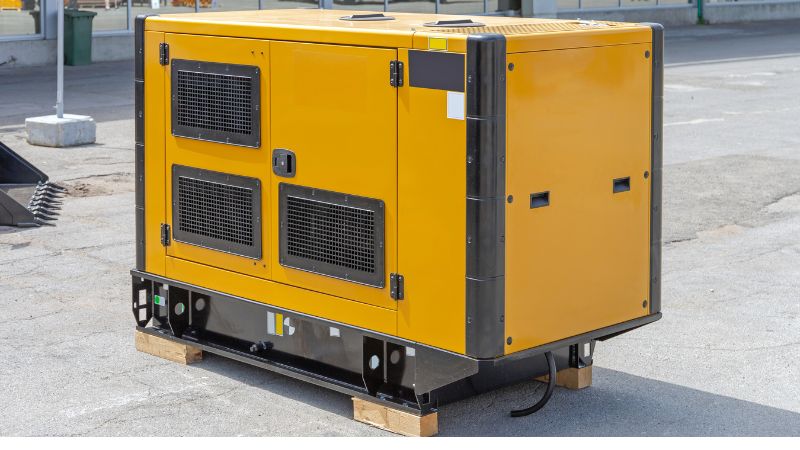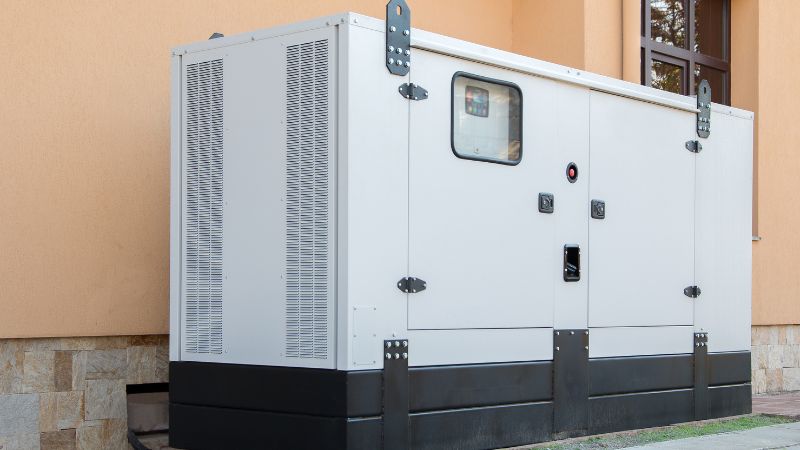Generators are super helpful, but let’s be honest—they can be as loud as a rock concert. The constant noise can annoy your neighbors, disrupt camping trips, and make you want to turn the thing off entirely.
In this guide, we will explore the various ways to make your generator more quiet. This guide will provide you with the knowledge and tools needed to minimize noise levels and create a more peaceful environment for both yourself and those around you.

Why Is My Generator So Loud?
Generators create noise from several parts of their operation, and understanding these sources can help you find effective solutions.
- Engine Size and Type
The engine is often the biggest noise culprit in your generator. Larger engines typically make more noise because they have more moving parts creating friction and combustion.
Two-stroke engines are usually louder than four-stroke engines. They complete the combustion cycle in half the time, creating more frequent noise bursts.
- Exhaust Noise
Your generator’s exhaust system can be extremely loud if not properly designed. Each engine combustion cycle forces hot gases out through the exhaust at high pressure, creating significant noise.
Some generators have resonators in addition to mufflers, but many don’t. Without this extra noise-dampening component, exhaust sounds travel farther.
- Vibration and Resonance
Generators create substantial vibration as their engines run, which translates directly into noise. This vibration can travel through the generator’s frame and into whatever surface it sits on.
Placing your generator on hard surfaces like concrete amplifies vibration and noise. The harder the surface, the more sound will reflect upward.
- Cooling Fans and Airflow
Your generator needs cooling systems to prevent overheating, and these fans create their own noise. Larger generators require more airflow, meaning bigger and often louder fans.
Fan blades that are damaged or unbalanced will make more noise as they spin. Even a small nick in a fan blade can create a noticeable whirring sound.
Tips To Make Your Generator Quieter

Noisy generators can be frustrating when camping or during power outages. These simple solutions can help you reduce generator noise without spending a lot of money or time.
Move The Generator Further Away
The easiest way to reduce generator noise is to move it further away. For every doubling of distance, you can gain about 6dB noise reduction. That’s a significant improvement!
Use longer extension cords to place your generator farther from your living space. Just make sure you’re using the right gauge cord for your power needs. Thinner cords can overheat with high-power appliances.
Keep your generator in a well-ventilated area. Never run it indoors or in enclosed spaces like garages. Carbon monoxide poisoning is serious business.
If you’re camping, try to position the generator behind natural sound barriers like trees or rocks. These can help absorb some of the noise.
Change The Surface Under The Generator
Hard surfaces like concrete or pavement reflect sound waves, making your generator seem louder. Softer surfaces absorb sound better.
Try placing the generator on grass or soil instead. This simple change can noticeably reduce noise. The reflection of noise into the ground works better on grass because it’s softer and absorbs sound better than hard surfaces.
Be careful with uneven ground though. Your generator needs to sit level to operate properly. An unlevel generator can cause additional noise and potential damage over time.
A carpet remnant or outdoor rug can also work in a pinch if you’re stuck on a hard surface. Just make sure it’s not flammable or too close to hot parts.
Use A Rubber Mat Or Anti-Vibration Pads
Much of a generator’s noise comes from vibrations transferred to the ground. Anti-vibration pads can significantly reduce this noise.
Place rubber mats or specialized anti-vibration pads under your generator. These absorb vibrations before they transfer to the surface below.
For a DIY solution, try:
- Old mouse pads
- Exercise mat pieces
- Rubber door mats
- Rubber vehicle floor mats
Make sure whatever you use can safely support the weight of your generator. The entire base should be supported to prevent tipping or instability.
If you’re feeling crafty, you can create a sandwich of plywood and rubber to make a more rigid but still vibration-dampening platform for your generator.
Build A Generator Quiet Box
A sound-dampening enclosure can dramatically reduce generator noise while still allowing proper ventilation. This takes more effort but gives great results.
To build a basic quiet box:
- Use MDF or plywood for the frame
- Line the inside with mass-loaded vinyl or acoustic foam
- Ensure plenty of ventilation holes
- Create a baffle system for air intake and exhaust
- Leave easy access for refueling and maintenance
Important safety tip: Never fully enclose a running generator! Engines need airflow for cooling and to prevent dangerous exhaust buildup.
Your box should be at least 2 feet larger than your generator on all sides. This gives room for heat dissipation and proper airflow. Making a generator quieter requires careful planning to avoid overheating.
Install A Better Muffler
The stock muffler on many generators isn’t designed for quietness. Upgrading to a better muffler can make a big difference.
Look for automotive-style mufflers that can be adapted to fit your generator’s exhaust port. These are designed to reduce noise more effectively than many stock generator mufflers.
When installing:
- Make sure connections are tight to prevent exhaust leaks
- Use high-temperature gasket material at connection points
- Consider adding flexible exhaust pipe to redirect exhaust
- Ensure the new setup doesn’t create back pressure
Some portable generators don’t have easily replaceable mufflers. In this case, you might need to consult a small engine repair shop for custom solutions.
Remember that modifying exhaust systems can affect engine performance if not done correctly.

Add A Noise-Reducing Exhaust Extension
If replacing the muffler isn’t practical, try adding an extension to redirect and diffuse the exhaust noise.
You can make the exhaust pipes face up or away from you to redirect the noise. A simple extension pipe can help direct noise upward or away from your living area.
For better results, try a water bucket muffler:
- Get a large bucket with a lid
- Fill it partially with water
- Run flexible exhaust pipe from generator into the water
- Make sure pipe end is submerged 2-3 inches
- Cut a small vent hole in the lid
The water helps cool and muffle the exhaust sound. Just be careful not to create too much back pressure on the engine.
Replace Worn Out Parts
Generators get louder as parts wear out. Fixing these issues can restore quieter operation.
Check these common problem areas:
- Loose bolts and fasteners (tighten them)
- Worn bearings (replace if making grinding noises)
- Damaged fan blades (replace if bent or chipped)
- Loose spark plug (tighten to proper torque)
- Damaged air filter (clean or replace)
Pay special attention to mounting points between the engine and frame. These often loosen over time and cause extra vibration and noise.
Regular inspection helps catch small issues before they become noisy problems. A generator in good mechanical condition is naturally quieter.
Routine Maintenance For Noise Reduction
Regular maintenance keeps your generator running smoothly and quietly. A well-maintained generator simply makes less noise.
Maintenance checklist:
- Change oil at recommended intervals
- Clean or replace air filter monthly during heavy use
- Check and adjust valve clearances yearly
- Keep cooling fins clean and unobstructed
By taking care of these simple tasks on a regular basis, you can prevent excessive wear and tear on your generator which can lead to increased noise levels.
Invest in a Quiet Generator
Investing in a quiet generator is a highly effective and proactive solution to reduce generator noise. Modern quiet generators are specifically designed to operate at lower decibel levels, making them much less disruptive to your surroundings.
Inverter generators stand out as an excellent choice. They not only produce less noise but also offer the added benefits of fuel efficiency and a more stable power output. This makes them ideal for various applications, from camping trips to residential backup power.
Frequently Asked Questions
What type of generator is the quietest?
The inverter generator is the quietest type. It adjusts engine speed based on load, reducing noise and fuel use. Silent generators (also called “super quiet”) are also very quiet, thanks to heavy-duty soundproofing.
How far away can you hear a generator?
The distance you can hear a generator depends on its noise level (dB), environment, and placement . A quiet 60 dB generator may be heard up to 100 feet in open areas, while louder models (70–90 dB) can be heard from 200–500+ feet.
Is it OK to enclose a generator?
Never use your generator indoors or in enclosed areas like garages, sheds, or tents. Generators emit deadly carbon monoxide (CO). Always place generators outside, at least 20 feet (6 meters) away from windows, doors, or vents, and ensure proper ventilation to prevent CO accumulation.
